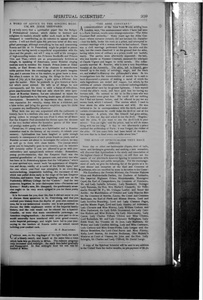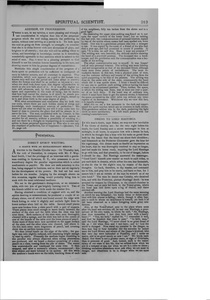A Word of Advice to the Singing Medium, Mr. Jesse Sheppard
I am truly sorry that a spiritualist paper like the Religio-Philosophical Journal, which claims to instruct and enlighten its readers, should suffer such trash as Mr. Jesse Sheppard is contributing to its columns to appear without review. I will not dwell upon the previous letter of this very gifted personage, although everything he has said concerning Russia and life at St. Petersburg might be picked to pieces by any one having merely a superficial acquaintance with the place and the people; nor will I stop to sniff at his nosegays of high-sounding names—his Princess Bulkoffs and Princes This and That—which are as preposterously fictitious as though, in speaking of Americans, some Russian singing medium were to mention his friends Prince Jones or Duke Smith, or Earl Brown—for if he chooses to manufacture noble patrons from the oversloppings of his poetic imagination, and it amuses him or his readers, no great harm is done. But when it comes to his saying the things he does in the letter of July 3rd, in that paper, it puts quite a different face upon the matter. Here he pretends to give historical facts but which never existed. He tells us of things he saw clairvoyantly, and his story is such a tissue of ridiculous, gross anachronisms that they not only show his utter ignorance of Russian history, but are calculated to injure the Cause of Spiritualism by throwing doubt upon all clairvoyant descriptions. Secondarily in importance they destroy his own reputation for veracity, stamp him as a trickster, and a false writer, and bring the gravest suspicion upon his claim to possess any mediumship whatever.
What faith can anyone, acquainted with the rudiments of history, have in a medium who sees a mother (Catherine II) giving orders to strangle her son (Paul I) when we all know that the Emperor Paul ascended the throne upon the decease of the very mother whom the inventive genius of this musical prodigy makes guilty of infanticide.
Permit me, O! young seer, as a Spiritualist and a Russian somewhat read in the history of my country, to refresh your memory. Spiritualism has been laughed at quite enough recently in consequence of such pious frauds as yours, and as Russian savants are about to investigate the subject, we may as well go to them with clean hands. The journal which gives you its hospitality goes to my country, and its interests will certainly suffer if you are allowed to go on with your embroidery and spangle-work without rebuke. Remember, young poetico-historian, that the Emperor Paul was the paternal grandfather of the present csar, and every one who has been at St. Petersburg knows that the “old palace,” which to your spiritual eye, wears such “an appearance of dilapidation and decay, worthy of a castle of the Middle Ages,” and the one where your Paul was strangled, is an everyday, modern-looking, respectable building, the successor of one which was pulled down early in the reign of the late Emperor Nicholas, and known from the beginning until now as the Pavlovsky Military College for the “Cadets.” And the two assassins, begotten in your clairvoyant loins—PETRESKI and KOFSKI! Really now, Mr. Sheppard, the gentlemanly assassins ought to be very much obliged to you for these pretty aliases!
It is fortunate for you, dear Sir, that it did not occur to you to discuss these questions in St. Petersburg, and that you evolved your history from the depths of your own consciousness, for in our autocratical country one is not permitted to discuss the little unpleasant verses of the Imperial family history, and the rule would not be relaxed for a Spanish Grandee, or even that more considerable personage, an American singing medium. An attempt on your part to do so would assuredly have interfered with your grand concert, under imperial patronage, and might have led to your journeying to the borders of Russia under an armed escort befitting your exalted rank.
The Abbe Constant
A correspondent of the New York World, writing from London, says, “An announcement which I have just seen in a Paris Journal, recalls some strange memories: ‘The Abbe Constant died yesterday.’ Many years ago the Abbe Constant—whose surname certainly did not betoken his character —lost his faith, broke his vows as a priest, and attempted to contract marriage with a woman whom he had seduced. There was a civil marriage performed between the abbe and the lady, but the courts dissolved it on the ground that the abbe, having taken vows of celibacy as a priest, could not lawfully marry. The parties soon afterwards separated; the lady, who was known as Naomee Constant, assumed the sobriquet of Claude Vignon and began to write novels. She subsequently married M. Rouvier, who is now a very Republican member of the Assembly. The abbe, left to himself, gave himself up to the study of astrology, magic, and the black art, and wished to discover the philosopher’s stone. In his investigations into the transmutation of metals he is said to have discovered a process of making a metal of which the main ingredients are nickel and copper, but which, by the addition of certain chemicals, is rendered indistinguishable from pure silver save by its greater lightness. I have myself visited the ahbe’s room, and have paid him for having my fortune told. He seemed to me to be like a man who was laboring under some great fear. He cuold tell me nothing that I had not known before, and he offered to pay me my money back, which I refused. The stories which I used to hear about the abbe were numerous and wild. He was believed to be in correspondence with the devil, and under certain circumstances he could make the devil or one of his imps appear. A priest, who like himself had gone astray, went to him one day and asked to see the devil. ‘Begone,’ said the abbe, ‘if you want to see the devil look in your mirror.’ ‘You are right,’ said the priest, ‘and he will do something with me ere long.’ A day or two afterwards a priest stabbed the archbishop of Paris: it was Verger, the visitor of the abbe. Of late years little had been heard of the abbe but now that he is dead every one talks about him.”
Omens to Lord Hastings
In this man's death, says Baker, we may see how inevitable the blows of destiny are: for the very night before his death, the Lord Stanley sent a secret messenger to him at midnight, in all haste, to acquaint him with a dream he had, in which he thought that a boar with his tusks so gored them both by the heads that the blood ran about their shoulders; and forasmuch as the Protector Gloucester gave the boar for his cognizance, this dream made so fearful an impression on his heart, that he was thoroughly resolved to stay no longer, and had made his horse ready, requiring the Lord Hastings to go with him, and that presently, to be out of danger, before it should be day. But Hastings answered the messenger, “Good Lord! leaneth your master so much to such trifles, to put such faith in dreams, which either his own tear fantasieth, or else do rise in the night’s rest, by reason of the day’s thoughts. Go back, therefore, to thy master, and commend me to him, and pray him to be merry, and have no fear, for I assure him I am as certain of the man hg wotteth as of my own hand.” The man he meant was Catesby, who deceived him, and with the Protector, plotted Hastings' death: be was arrested for treason by Gloucester, in the council-chamber in the Tower, and at once led forth to the Tower-green, where his head was laid down upon a log of timber, and there stricken off.
Another warning the Lord Hastings had the same morning on which he was beheaded; his horse twice or thrice stumbled with him almost to falling; which, though it often happen to such to whom no mischance is toward, yet hath it of old been observed as a token foregoing some great misfortune.
Also, at the Tower-wharf, near to the place where soon after his, head was stricken off, he met one Hastings, a poursuivant of his own name, to whom he said. “Ah, Hastings, dost thou remember I met thee here once with a heavy heart?” “Yes, my lord,” replied he, “I remember it well, and God be thanked that time is past.” “In faith, man,” said the Lord Hastings, “I never stood in to great dread of life as I did when thou and I met here; and lo! how the world is changed. Now stand my enemies in the danger, as thou may hap to hear hereafter (for the enemies he meant were the Lord Rivers and others of the Queen’s kindred, who that very day were beheaded at Pomfret), and I never so merry, and in so good surety as now I am.” We know, says Baker, that there is not a greater omen, or sign of ill-fortune, than to presume of good. And, indeed, such it the uncertainty of our state in this life, that we seldom know when we are in a tempest at sea, nor when we are in a calm on shore; thinking ourselves oftentimes most safe when we are most in danger, and oftentimes to be in danger when we are most safe.
Editor's notes


